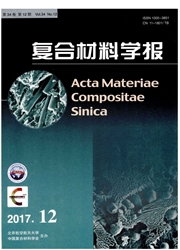

 中文摘要:
中文摘要:
Ablation behaviors of silicon carbide(SiC)coated 2Dcarbon fiber reinforced silicon carbide matrix(designated as 2DC/SiC)composites prepared by chemical vapor infiltration(CVI)were investigated by a continuous wave CO2 laser.The 2DC/SiC specimens were exposed under laser for 0.5sin ambient air,and the laser powers varied from 500Wto 1500W.A 3Dfinite element model was established to calculate the temperature distribution in the laser ablation process.The ablation depth,width and profile were measured by Laser Confocal Microscope(LCM).The results indicate that the increase of ablation depth follows a linear relation with the increase of laser power,and the increase of ablation width follows a similar trend with the increase of the isotherm diameter of 1712℃.The ablated surface can be distinguished into three different regions by scanning electron microscope(SEM)observation,including ablation center,transition zone and ablation fringe.The ablation behaviors of carbon fibers and SiC matrices in different regions were presented and discussed in the study.
 英文摘要:
英文摘要:
Ablation behaviors of silicon carbide (SiC) coated 2D carbon fiber reinforced silicon carbide matrix (designated as 2D C/SiC) composites prepared by chemical vapor infiltration (CVI) were investigated by a continuous wave CO2 laser. The 2D C/SiC specimens were exposed under laser for 0.5 s in ambient air, and the laser powers varied from 500 W to 1500 W. A 3D finite element model was established to calculate the temperature distribution in the laser ablation process. The ablation depth, width and profile were measured by Laser Confocal Microscope (LCM). The results indicate that the increase of ablation depth follows a linear relation with the increase of laser power, and the increase of ablation width follows a similar trend with the increase of the isotherm diameter of 1712 ℃. The ablated surface can be distinguished into three different regions by scanning electron microscope (SEM) observation, including ablation center, transition zone and ablation fringe. The ablation behaviors of carbon fibers and SiC matrices in different regions were presented and discussed in the study.
 同期刊论文项目
同期刊论文项目
 同项目期刊论文
同项目期刊论文
 期刊信息
期刊信息
